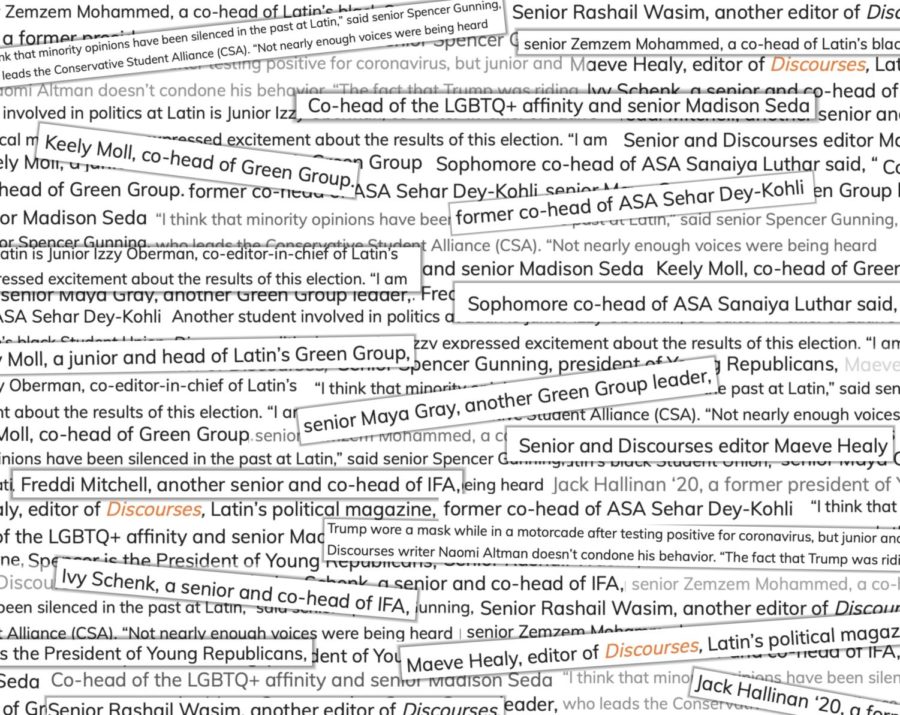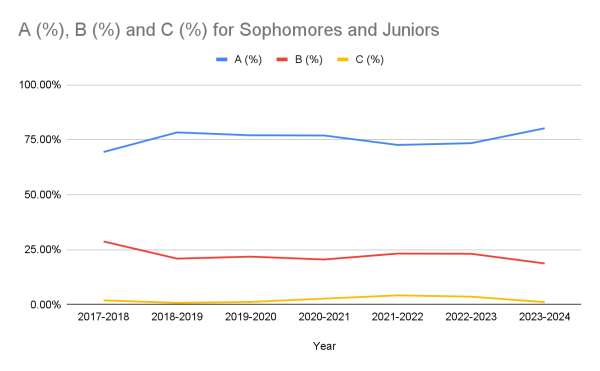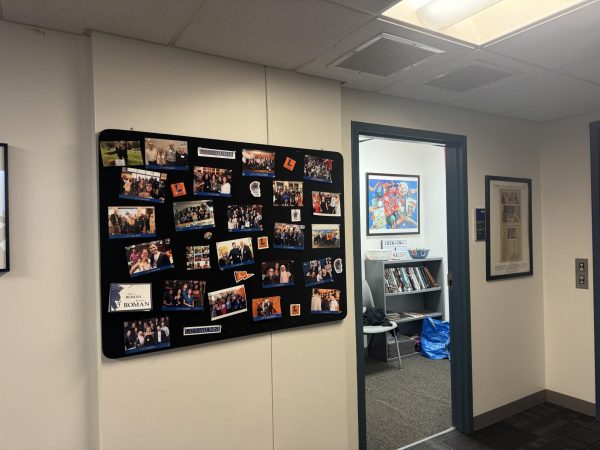How Representative is ‘The Forum’ of the Student Body?
The Forum generally requires writers to seek out a minimum of three sources from the Latin community for each of their articles, stipulating that each piece must include a variety of relevant sources. While the publication certainly quotes students associated with each topic discussed, does it sufficiently expand its lens beyond an often recycled pool of sources?
The Forum keeps an unofficial list of frequently quoted students so that writers don’t always go back to the same sources and instead diversify the spectrum of interviewees. Senior and Forum standards editor Ashna Satpathy explained, “We want to make sure that we’re representing the voices of as many people as possible who go to the school, so just interviewing the same person every article doesn’t really meet that goal.” However, she doesn’t think that writers should completely abandon a source, especially if their opinion is relevant to an article.
60.8% of students quoted since The Forum’s September 16 edition, spanning to the recent March 1 release, consisted of juniors and seniors: more established students within the Upper School who often hold higher level positions in clubs and/or affinity groups (which makes sense because most freshmen don’t even know most of their own grade given Latin’s current virtual environment). Staff Writer Eliza Lampert noted her rationale as to why writers tend to repeatedly quote heads of clubs and affinities, saying, “I think that the heads are just the most accessible and knowledgeable about the topics, at least as far as we know.”
Fellow staff writer McLaine Leik corroborated Eliza’s sentiments and said, “If someone is the head of a club or the head of a department, I assume that they have knowledge or passion about their club or department.”
Junior Keely Moll, a frequently interviewed co-head of Latin’s Green Group, agreed. “I think it’s good that [writers] look to Latin’s club heads and trust that we’re informed with current events, but I also think that they could reach out to club members more.” Keely pointed out that many club members share her interest in helping the environment and suggested that writers either reach out to more students involved in the club or allow clubs to give a group statement in articles, especially since Green Group revolves around discussions.
Junior Arjun Singh, who has acquired environmental knowledge as the founder of Latin’s Science Olympiad team and through working on environmental activism focused on light pollution, said, “I think it is great that there is a Green Club at Latin, but, for representation in Forum articles, there are a lot of other students and clubs that also have opinions and quotes on these matters, and I think it would be wise to broaden the scope a bit to include those voices.”
But determining who’s passionate about a subject can prove difficult for writers. “If you aren’t part of the club, you don’t know who goes,” Eliza explained. She used The Forum’s email list as an example of how knowing who’s technically part of a club doesn’t necessarily indicate their level of participation; the email chain includes 72 recipients, 22 of whom have never released an article and 14 who previously wrote for the newspaper but haven’t this school year.
Sophomore and staff writer Armaan Shah also sees a need to expand the list of those quoted in The Forum. “We’ve gotten to a point where we’re constantly interviewing the heads,” he said, adding, “I feel like maybe we should reach out to the heads, and they could give us a list of their most frequent attendees.” As of the March 1 edition, The Forum quoted 209 students this school year, a fairly sizable figure equating to 42.1% of the Upper School student body. Of those quoted, 43.5% have been quoted in multiple articles. Talking to more club members, or community members in general, could broaden the spectrum.
Ideally, club heads could send out lists to The Forum including their most involved members, but when discussing affinities, anonymity factors into who writers quote. Co-head of the LGBTQ+ affinity Madison Seda said, “Especially with our affinity, it’s a little difficult, because there are people that obviously may be out but don’t feel comfortable being quoted for The Forum, for example,” adding that, “I think it’s so much easier to go directly to the heads because we’re so out there.” Madison suggested that writers reach out to their co-head, Kazi Stanton-Thomas, or themself in advance, so the affinity could collectively formulate a response, and then the heads could communicate what the affinity brainstormed to writers. Despite the increased representation that a group quote could provide for those wishing to stay anonymous, discussing quotes in advance removes a layer of authenticity that comes with an interview.
“I would say that when I try to answer, I tend to answer as much as I can from my experience and my opinions, but it does feel like when we’re being interviewed, we’re supposed to be the spokespersons of the community,” Kazi said, so hopefully a new interviewing system would enable writers to project a wider range of voices. Kazi, who has been quoted seven times this year, added, “Sometimes there’s an imbalance of the people being interviewed,” mentioning that ze sometimes feels like a “token interviewee.”
Junior Zoe Weiss, an active member of the Intersectional Feminist Alliance (IFA), doesn’t necesarily feel underrepresented, despite writers not asking her for quotes regarding the club. “I do feel like the club heads do a good job of representing us all, but I think that within our club, there are a lot of girls who share different identities,” she said. Zoe thinks that the intersectionality that accompanies the club makes it especially difficult to reflect a singular group identity.
McLaine also noted that writers often reuse sources because they know that the student will respond. “It can sometimes be difficult to find people to give quotes because people are concerned that their quote may be misinterpreted or viewed as controversial,” she said. “So, Forum writers know which people are willing to give quotes and which people usually don’t want to give quotes, which narrows the pool of potential sources.”
Senior Spencer Gunning, president of the Conservative Student Alliance (CSA), a historically controversial club, weighed in. “I’ve had some experiences where people have blended my views with others in the club or past presidents. I have kindly corrected them and moved on,” he explained. “That issue has greatly gone down, however, this year.”
Whether due to fear of sparking uncivil discourse, not wishing to publicize an intersection of identity, lack of interest in giving a quote, or writers never reaching out, 57.9% of Latin students’ voices remain unheard. The Forum will strive to increase representation among Upper School students and listen to the suggestions of the community. As Arjun said, “It is important to make sure that a school like Latin can share the voices of their students.”
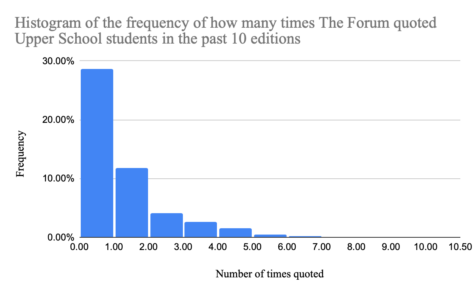
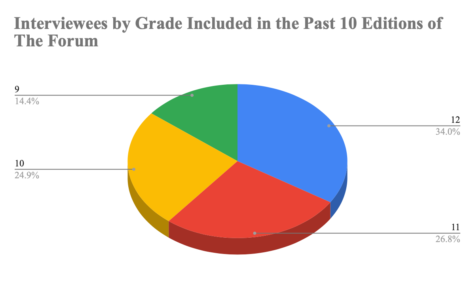
Prior to writing the article above, The Forum’s features editors, Angela Gil and Marin Creamer, interviewed Upper School English teacher Lang Kanai, who had left an insightful comment under a previous article on the state of civil discourse at Latin. The interview spurred many of the questions that led Marin to write the above piece.

Marin Creamer ('22) can’t wait to serve her first year as an Editor-In-Chief for The Forum. Writing and editing for the publication has been...


















































